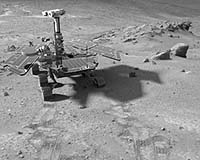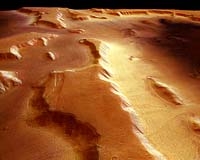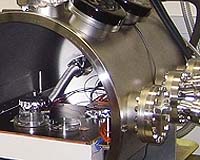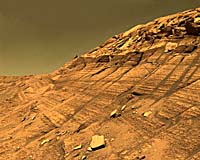| June 15, 2007 |  |
our time will build eternity |
| Previous Issues | Jun 14 | Jun 13 | Jun 12 | Jun 11 | Jun 08 |
Wandering Poles May Explain Ups And Downs Of Ancient Mars Shoreline Berkeley CA (SPX) Jun 13, 2007
Berkeley CA (SPX) Jun 13, 2007Berkeley geophysicists claim that a new study demolishes one of the key arguments against the past presence of large oceans on Mars. Even from Earth, a large plain surrounding the planet's north pole looks like a sediment-filled ocean basin. In the 1980s, Viking spacecraft images revealed two possible ancient shorelines near the pole, each thousands of kilometers long with features like those found in Earth's coastal regions. ... more Opening The Hatch On The Mars Underground  Cameron Park CA (SPX) Jun 13, 2007
Cameron Park CA (SPX) Jun 13, 2007As I mentioned in my last chapter, we have now definitely found the first caves on another world -- cave openings on the slopes of Arsia Mons ("Mt. Arsia", the southermost of the four great Tharsis shield volcanoes). These are volcanically-produced caves, rather than caves produced by water erosion or by the chemical erosion of minerals that can be produced by acidic water. They must be one of ... more Down The Hatch On Mars  Cameron Park CA (SPX) Jun 12, 2007
Cameron Park CA (SPX) Jun 12, 2007Our explorations of the Solar System so far have yet to turn up the really big prize -- evidence of life on another world -- but they have revealed one amazing nonliving surprise after another. Last month, we finally got airtight confirmation of something we've been looking for some time: the first caves seen on another world. ... more The Viability Of Methane-Producing Microorganisms In Simulated Martian Soils  Fayetteville AK (SPX) Jun 11, 2007
Fayetteville AK (SPX) Jun 11, 2007University of Arkansas researchers have tested the methane production of three different types of microorganisms in different soil types that resemble those found on Mars to test the possibility of these soils harboring life. Tim Kral, professor of biological sciences at the University of Arkansas; Heaven A. Kozup of Gwynedd-Mercy College in Pennsylvania, and UA graduate student ... more In Search Of A Martian Future  Cameron Park CA (SPX) Jun 06, 2007
Cameron Park CA (SPX) Jun 06, 2007The latest in a whole series of reports by NASA's scientific advisory groups on how to explore Mars has just been released ("An Astrobiology Strategy for the Exploration of Mars", written by a committee assembled by NASA a year ago) has just been released by the Space Studies Board of the National Research Council. Over the last few years, as new scientific information on Mars has finally ... more |
exo-life
 mars-mers  farm  |
 Moffett Field CA (SPX) May 29, 2007
Moffett Field CA (SPX) May 29, 2007Could terrestrial organisms be grown on Mars without containing our neighbor planet? And if there is indigenous life on Mars, could NASA safely bring back a sample back to Earth for study? To find out, Astrobiology Magazine's field research editor Henry Bortman spoke with Dr. Cassie Conley, NASA's acting Planetary Protection Officer. Astrobiology Magazine: Chris McKay of NASA Ames h ... more Seeking Mars Survival Secrets  Princeton NJ (SPX) May 23, 2007
Princeton NJ (SPX) May 23, 2007David Smith always wondered whether other planets might harbor life, so when he actually got the opportunity to investigate, he jumped at it. His decision launched him on a year-long mission, leading him to the Kennedy Space Center and back. Now, after long months exploring whether Earth bacteria can survive on the surface of Mars, he has returned with findings that could help NASA plan better m ... more New Process Generates Hydrogen from Aluminum Alloy To Run Engines And Fuel Cells  West Lafayette, IN (SPX) May 23, 2007
West Lafayette, IN (SPX) May 23, 2007A Purdue University engineer has developed a method that uses an aluminum alloy to extract hydrogen from water for running fuel cells or internal combustion engines, and the technique could be used to replace gasoline. The method makes it unnecessary to store or transport hydrogen - two major challenges in creating a hydrogen economy, said Jerry Woodall, a distinguished professor of electrical a ... more Mars Rover Spirit Unearths Surprise Evidence Of Wetter Past  Pasadena CA (SPX) May 22, 2007
Pasadena CA (SPX) May 22, 2007A patch of Martian soil analyzed by NASA's rover Spirit is so rich in silica that it may provide some of the strongest evidence yet that ancient Mars was much wetter than it is now. The processes that could have produced such a concentrated deposit of silica require the presence of water. Members of the rover science team heard from a colleague during a recent teleconference that the alpha ... more |
marsexpress
 exo-life  mars-life  |
 Moffett Field CA (SPX) May 11, 2007
Moffett Field CA (SPX) May 11, 2007Can life travel from planet to planet? When a rocky world is hit by a meteorite, the impact can send pieces of the planetary surface out into space, and eventually these ejected rocks can travel to other planets in the solar system. Here on Earth we have collected many meteorites that originated from the moon and from Mars, and there are also likely rocks from Earth sitting on the surfaces of ou ... more Next Mars Lander Crosses The Mississippi  Cape Canaveral FL (SPX) May 09, 2007
Cape Canaveral FL (SPX) May 09, 2007A U.S. Air Force C-17 cargo aircraft carried NASA's Phoenix Mars Lander spacecraft Monday, May 7, from Colorado to Florida, where Phoenix will start a much longer trip in August. After launch, Phoenix will land on a Martian arctic plain next spring. It will use a robotic digging arm and other instruments to determine whether the soil environment just beneath the surface could have been a favorab ... more Mars Rover Spirit Finds Evidence Of Ancient Volcanic Explosion  Ithaca NY (SPX) May 04, 2007
Ithaca NY (SPX) May 04, 2007NASA's Mars Exploration Rover Spirit has discovered evidence of an ancient volcanic explosion at "Home Plate," a plateau of layered bedrock approximately 2 meters (6 feet) high within the "Inner Basin" of Columbia Hills, at the rover's landing site in Gusev Crater. This is the first explosive volcanic deposit identified with a high degree of confidence by Spirit or its twin, Opportunity. ... more Depth-To-Ice Map Of A Southern Mars Site Near Melea Planum  Pasadena CA (SPX) May 03, 2007
Pasadena CA (SPX) May 03, 2007Color coding in this map of a far-southern site on Mars indicates the change in nighttime ground-surface temperature between summer and fall. This site, like most of high-latitude Mars, has water ice mixed with soil near the surface. The ice is probably in a rock-hard frozen layer beneath a few centimeters or inches of looser, dry soil. The amount of temperature change at the surface likely corr ... more
|
satellite-tech
 mars-driller  asteroid  |
| Previous Issues | Jun 14 | Jun 13 | Jun 12 | Jun 11 | Jun 08 |
| The contents herein, unless otherwise known to be public domain, are Copyright 1995-2007 - SpaceDaily. AFP and UPI Wire Stories are copyright Agence France-Presse and United Press International. ESA Portal Reports are copyright European Space Agency. All NASA sourced material is public domain. Additional copyrights may apply in whole or part to other bona fide parties. Advertising does not imply endorsement, agreement or approval of any opinions, statements or information provided by SpaceDaily on any web page published or hosted by SpaceDaily. Privacy statement |